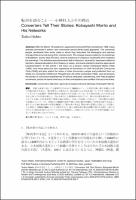Chapter 転向を語ること ─ 小林杜人とその周辺 / Converters Tell Their Stories: Kobayashi Morito and His Networks
Abstract
After the 'March 15 incident' on Japanese Communist Party members in 1928, many activists converted in prison, and "conversion period" (tenkō jidai) appeared. The converted people (tenkōsha) then wrote notes in which they described the ideological and spiritual changes that occurred during their imprisonment. The change was prompted by the teachings of Buddhism, mainly Jōdo Shinshū, and the presence of chaplains (kyōkaishi) who mediated the teachings. The tenkōsha abandoned their faith in Marxism, returned to Japanese traditional familism, became devoted to the Emperor of Japan, and some started to practice agricultural fundamentalism. In this article, I will focus on a person named Kobayashi Morito (1902 -1984), who wrote about his own experience of conversion in Until He Left the Communist Party (1932) and also edited the notes of other conversion people and published them as Notes of a Converter (1933) and Thought and Life of the Converted(1935), and will analyze the stories of conversion experiences of various tenkōsha, reexamining how they accepted conversion, and at the same time focus on the contradictions and conflicts that occurred there.


 Download
Download Web Shop
Web Shop